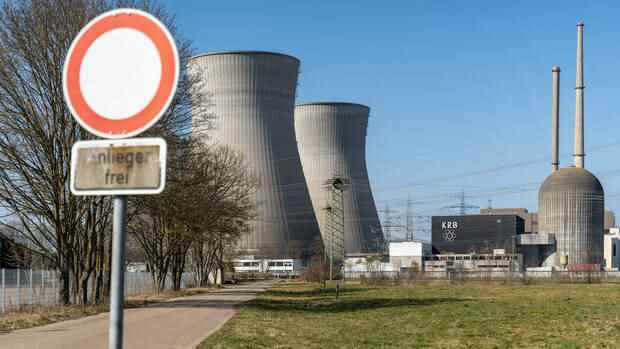The power plant went offline at the end of 2021.
(Photo: IMAGO/Bihlmayerfotografie)
Munich In May 2011, Markus Söder, then Environment Minister of the CSU, said he was pleased with the decision to phase out nuclear power. After all, this was “also my suggestion, Horst Seehofer’s suggestion and the CSU’s suggestion”. Eleven years later, the mood in Bavaria has changed. Because Germany’s largest federal state is particularly dependent on Russian natural gas.
Bavaria’s Prime Minister Söder has therefore been calling for months to extend the nuclear power plant runtimes for the three power plants that are still in operation until 2025. Even more: Bavaria’s Economics Minister Hubert Aiwanger (free voters) even demands that the reactors in Grohnde, Brokdorf, which were shut down at the end of 2021, and above all that to reactivate the Gundremmingen nuclear power plant in Bavaria.
Nuclear power plants can supply electricity, but unlike gas or coal-fired power plants, they cannot provide district heating, which is urgently needed in winter. A report by Energy Brainpool comes to the conclusion that the benefit would be very small if the three active nuclear power plants were allowed to continue running in 2023. Together they would save a maximum of 8.7 terawatt hours (TWh) of natural gas consumption, which corresponds to around one percent of Germany’s annual consumption.
But how does it look technically? Preussen Elektra, operator of the Grohnde and Brokdorf nuclear power plants, does not want to comment on the “re-launched debate about the reactivation of the plants”. RWE, the operator of the Gundremmingen nuclear power plant, also “does not want to take part in political speculation”.
Top jobs of the day
Find the best jobs now and
be notified by email.
For Gundremmingen, a report from the TÜV Süd commissioned by the Bavarian state government is available from April. The examiners came to the conclusion that a reactor core could be put together from the fuel elements in Unit C that would enable operation for a further six months and would fulfill “all safety-related boundary conditions”.
This corresponds to an electricity volume of 4900 gigawatt hours (GWh) and, according to Uwe Stoll, Managing Director of the Society for Plant and Reactor Safety, could supply the 1.5 million residents of Munich with electricity for two years. According to Tüv Süd, no new fuel elements are needed, for which experts calculate a procurement period of 12 to 18 months. According to Stoll, Gundremmingen completed the “periodic safety review” (PSÜ) required every ten years, a complete safety assessment by the operator, in 2017.
>> Read here: Under these conditions, nuclear power plants could run longer
According to the expert, power plants whose PSR was more than ten years old could catch up on the inspection during operation without shutting down the power plant. However, if the radioactive facilities had already been decontaminated, the effort involved in providing evidence would be too great, according to Stoll. The chemicals used can damage surfaces and radioactivity could escape. According to Stoll, Grohnde has been decontaminated.
In Block C in Gundremmingen, all measures that “were taken for permanent non-performance operation” could be withdrawn, according to Tüv Süd. The certifier calculated a time requirement of six months for this. RWE has not been able to find out whether the fuel rods can still be used almost four months after the report was published. Most recently, the energy company has repeatedly emphasized that the plant is being dismantled.
The Bundestag would have to decide whether to continue operating or reactivate the nuclear power plants. “Despite the phase-out date for nuclear energy and without significant coal reserves, Bavaria has relied heavily on Russian natural gas and at the same time delayed the expansion of wind power.
To continue to be responsible for a high-risk technology that hardly provides any remedy for a gas crisis and to pass the liability risks on to taxpayers will not be possible without considerable resistance, believes Volker Quaschning, an energy expert from the University of Applied Sciences in Berlin.
More: EU states agree: Europe should use less gas in winter

